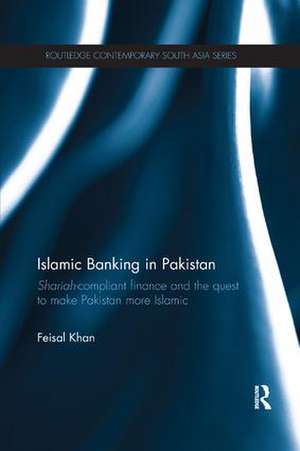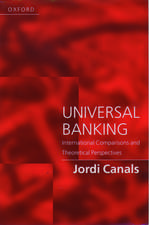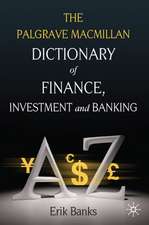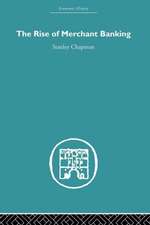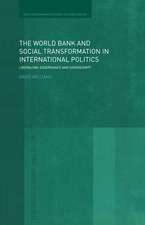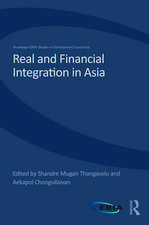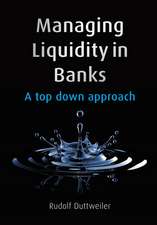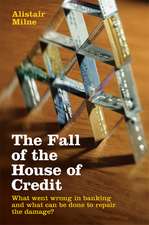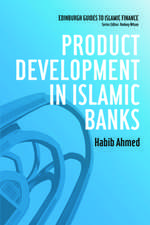Islamic Banking in Pakistan: Shariah-Compliant Finance and the Quest to make Pakistan more Islamic: Routledge Contemporary South Asia Series
Autor Feisal Khanen Limba Engleză Paperback – 4 feb 2019
This book analyses the push to Islamize Pakistan and its financial system by Islamic revivalists, following the early 1947 debates in the original Constituent Assembly to the final 2002 ruling on IBF of the Shariat Appellate Bench of the Pakistan Supreme Court. It examines the practice and theory behind contemporary Islamic, "Shariah-compliant", banking. It offers extensive interviews with Pakistani Islamic bankers on the state of their industry and how they see it developing, and provides analysis on how the Islamic banks’ customers differ from those of conventional ones.
Presenting a critical analysis of Pakistan’s IBF experience and offering a new insight into Pakistan’s banking industry that illustrates broader political and social trends in the country, this book will be of interest to specialists on Islam, South Asia and International Economics.
| Toate formatele și edițiile | Preț | Express |
|---|---|---|
| Paperback (1) | 412.37 lei 6-8 săpt. | |
| Taylor & Francis – 4 feb 2019 | 412.37 lei 6-8 săpt. | |
| Hardback (1) | 1053.95 lei 6-8 săpt. | |
| Taylor & Francis – 17 dec 2015 | 1053.95 lei 6-8 săpt. |
Din seria Routledge Contemporary South Asia Series
-
 Preț: 393.91 lei
Preț: 393.91 lei -
 Preț: 310.08 lei
Preț: 310.08 lei - 8%
 Preț: 389.84 lei
Preț: 389.84 lei -
 Preț: 304.19 lei
Preț: 304.19 lei -
 Preț: 316.71 lei
Preț: 316.71 lei -
 Preț: 328.88 lei
Preț: 328.88 lei -
 Preț: 349.03 lei
Preț: 349.03 lei - 9%
 Preț: 1035.78 lei
Preț: 1035.78 lei - 18%
 Preț: 1056.00 lei
Preț: 1056.00 lei - 28%
 Preț: 848.40 lei
Preț: 848.40 lei - 18%
 Preț: 1059.48 lei
Preț: 1059.48 lei - 18%
 Preț: 1063.41 lei
Preț: 1063.41 lei - 18%
 Preț: 1060.87 lei
Preț: 1060.87 lei - 18%
 Preț: 1057.26 lei
Preț: 1057.26 lei - 18%
 Preț: 1057.75 lei
Preț: 1057.75 lei - 18%
 Preț: 1061.93 lei
Preț: 1061.93 lei - 18%
 Preț: 1057.05 lei
Preț: 1057.05 lei - 18%
 Preț: 1062.98 lei
Preț: 1062.98 lei - 18%
 Preț: 1049.21 lei
Preț: 1049.21 lei - 18%
 Preț: 1058.79 lei
Preț: 1058.79 lei - 18%
 Preț: 1057.09 lei
Preț: 1057.09 lei - 18%
 Preț: 705.87 lei
Preț: 705.87 lei - 18%
 Preț: 1054.97 lei
Preț: 1054.97 lei - 18%
 Preț: 1109.42 lei
Preț: 1109.42 lei - 28%
 Preț: 823.63 lei
Preț: 823.63 lei - 18%
 Preț: 1169.78 lei
Preț: 1169.78 lei - 30%
 Preț: 846.42 lei
Preț: 846.42 lei - 18%
 Preț: 1054.71 lei
Preț: 1054.71 lei - 18%
 Preț: 1057.75 lei
Preț: 1057.75 lei - 18%
 Preț: 1062.98 lei
Preț: 1062.98 lei - 28%
 Preț: 822.36 lei
Preț: 822.36 lei - 28%
 Preț: 848.15 lei
Preț: 848.15 lei - 18%
 Preț: 1053.92 lei
Preț: 1053.92 lei - 18%
 Preț: 698.58 lei
Preț: 698.58 lei - 18%
 Preț: 1058.79 lei
Preț: 1058.79 lei - 18%
 Preț: 1062.98 lei
Preț: 1062.98 lei - 18%
 Preț: 1057.75 lei
Preț: 1057.75 lei - 18%
 Preț: 1060.87 lei
Preț: 1060.87 lei - 18%
 Preț: 1057.40 lei
Preț: 1057.40 lei - 18%
 Preț: 1057.13 lei
Preț: 1057.13 lei - 18%
 Preț: 1165.87 lei
Preț: 1165.87 lei - 25%
 Preț: 823.63 lei
Preț: 823.63 lei - 18%
 Preț: 1059.48 lei
Preț: 1059.48 lei -
 Preț: 378.43 lei
Preț: 378.43 lei - 18%
 Preț: 1055.51 lei
Preț: 1055.51 lei - 18%
 Preț: 1057.75 lei
Preț: 1057.75 lei - 18%
 Preț: 1227.38 lei
Preț: 1227.38 lei - 28%
 Preț: 850.37 lei
Preț: 850.37 lei - 18%
 Preț: 1166.01 lei
Preț: 1166.01 lei
Preț: 412.37 lei
Nou
Puncte Express: 619
Preț estimativ în valută:
78.93€ • 85.77$ • 66.35£
78.93€ • 85.77$ • 66.35£
Carte tipărită la comandă
Livrare economică 21 aprilie-05 mai
Preluare comenzi: 021 569.72.76
Specificații
ISBN-13: 9780367232023
ISBN-10: 0367232022
Pagini: 204
Ilustrații: 68
Dimensiuni: 156 x 234 x 11 mm
Greutate: 0.36 kg
Ediția:1
Editura: Taylor & Francis
Colecția Routledge
Seria Routledge Contemporary South Asia Series
Locul publicării:Oxford, United Kingdom
ISBN-10: 0367232022
Pagini: 204
Ilustrații: 68
Dimensiuni: 156 x 234 x 11 mm
Greutate: 0.36 kg
Ediția:1
Editura: Taylor & Francis
Colecția Routledge
Seria Routledge Contemporary South Asia Series
Locul publicării:Oxford, United Kingdom
Public țintă
PostgraduateCuprins
1. Islamic Banking and Finance Worldwide 2. Muslim Nationalism, Islamic Revivalism and the Creation of Pakistan 3. Islamizing Pakistan Post-Jinnah 4. The Debate Over Riba 5. The New Orthodoxy of ‘Old’ Islamic Financial Norms 6. The ‘Nuts and Bolts’ of Islamic Banking Worldwide 7. Making Islamic Banking Even More Islamic 8. Pakistan’s ‘Rebooted’ Islamic Banking 9. Quo Vadimus, Pakistani Banking?
Notă biografică
Feisal Khan is Chair of the Economics Department at Hobart and William Smith Colleges in New York, USA. He has published on economic development and corruption in Pakistan in academic journals and edited volumes.
Descriere
This book analyses the push to Islamize Pakistan and its financial system by Islamic revivalists. It offers extensive interviews with Pakistani Islamic bankers on the state of their industry and how they see it developing, and provides analysis on how the Islamic banks’ customers differ from those of conventional ones.
